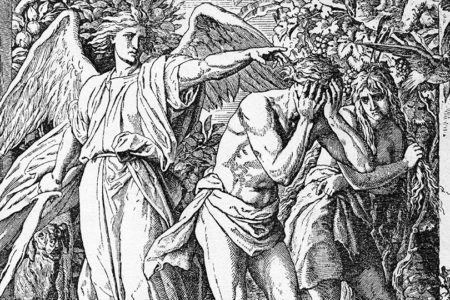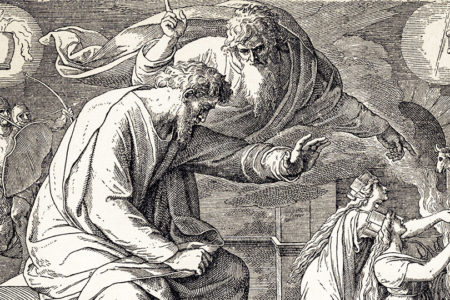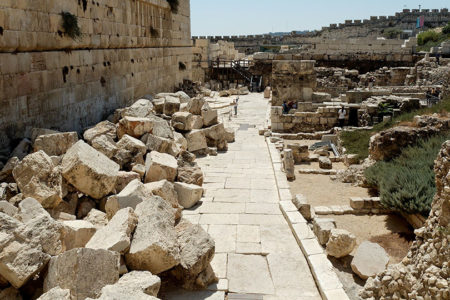Awaiting a ‘Song in the Night’ Lamentations 3
C. S. Lewis wrote in The Problem of Pain, “God whispers to us in our pleasures, speaks in our conscience, but shouts in our pain: it is His megaphone to rouse a deaf world.”
The southern kingdom of Judah was in trouble with God. About a century earlier, the Lord had allowed the Assyrians to destroy the northern kingdom of Israel. That event should have served as a graphic warning against apostasy. but despite repeated warnings, Judah persisted in rebelling against God.
Jeremiah—rejected, threatened, beat-en, and even imprisoned by his own people—had to pronounce God’s irrevocable message of impending judgment (Jer. 25:11). The catastrophe that came on Judah and Jerusalem in 586 B.C. revealed the devastating effects of sin and disobedience. The national disaster became Jeremiah’s personal agony. Yet the prophet came to appreciate the fact that God’s presence is keenly felt during the darkest of times; if we wait, seek, and hope in the Lord, He eventually gives a “song in the night” (Ps. 77:6).
His Agony
And I said, “My strength and my hope Have perished from the Lᴏʀᴅ.” Remember my affliction and roaming, The wormwood and the gall [bitterness] (Lam. 3:18–19).
It’s been said that prayer, affliction, and temptation form the heart of a servant. The prophet Jeremiah’s heart had been tempered in the school of affliction. His anguish is described as a heavy drain on his being, producing a completely restless heart and mind. The bitterness associated with the curses God promised Israel for disobedience became his portion (dt. 28:15–68).
He tried hard to warn the Israelites, but no one took him or God seriously. He stood virtually alone, seeking to stem the tide of iniquity. beaten and imprisoned, hated and mocked, rejected, despised, and considered a traitor to the nation, Jeremiah’s life became unbearable. In his anguish he grumbled that even God purposely turned against him (3:3).
He felt trapped, as though bound in heavy chains or buried alive in a dark place with no hope of escape (vv. 5–7). He moaned that his prayers were ignored and his peace was stripped away (vv. 8, 17). deep within his heart and soul he cried, “‘My strength and my hope have perished from the Lᴏʀᴅ’” (v. 18). His agony was intense.
Jeremiah was a true servant of God and identified and suffered with his nation as it was being judged for sin. Israel’s ordeal serves as a warning concerning the awful effects of sin on both individuals and nations. Scripture states, “Do not be deceived, God is not mocked; for whatever a man sows, that he will also reap” (Gal. 6:7; cf. Job 4:8). A life sown in sin, iniquity, and transgression will not reap the blessings of God (Ps. 5:5; 66:18; Prov. 3:33; Jer. 17:10; Col. 3:25; 1 Pet. 3:12).
Suffering due to sin is God’s megaphone to awaken a godless world (Jer. 32:19; Rom. 2:9). It is also God’s way, on occasion, to agitate a casual and careless spiritual life (1 cor. 11:32; Heb. 12:11). Judah sinned and failed to repent:
Because you have burned incense and because you have sinned against the Lᴏʀᴅ, and have not obeyed the voice of the Lᴏʀᴅ or walked in His law, in His statutes or in His testimonies, therefore this calamity has happened to you, as at this day (Jer. 44:23).
God does not derive pleasure in allowing grief and affliction (Lam. 3:33). But He means what He says and says what He means.
The world stands guilty before a righteous God (Rom 3:23). It is His prerogative to deal with sin according to His plan: “Why should a living man complain, a man for the punishment of his sins?” (Lam. 3:39). Therefore, “Let us search out and examine our ways, and turn back to the Lᴏʀᴅ; Let us lift our hearts and hands To God in heaven” (vv. 40–41).
His Assurance
This I recall to my mind, Therefore I have hope. Through the Lᴏʀᴅ’s mercies we are not consumed, because His compassions fail not. They are new every morning; great is Your faithfulness. For the Lord will not cast off forever. Though He causes grief, yet He will show compassion according to the multitude of His mercies (vv. 21–23; 31–32).
Amid much gloom, Jeremiah purposely called to mind three certainties about God. First, he recalled the Lord’s mercies. The Hebrew word for “mercies” is rich in meaning and communicates the profound ideas of God’s loyal, covenantal loving-kindness, faithfulness, and goodness.
Though Jeremiah testified of the afflictions that came by the rod of God’s wrath (v. 1), he still possessed hope for himself and his people. It rested on the firm promise, “Through the Lᴏʀᴅ’s mercies we are not consumed (v. 22).” Like the bush that burned before Moses yet was not consumed (Ex. 3:2), Israel, whatever its misfortunes, will never be destroyed (cf. Jer. 35—37).
In the New Testament the same assurance is given to the church: “We are hard pressed on every side, yet not crushed; we are perplexed, but not in despair; persecuted, but not forsaken; struck down, but not destroyed” (2 Cor. 4:8–9). We may be chastened, corrected, even refined like silver or gold in the furnace of life; still we will not be consumed as dross. God can be trusted. Jeremiah knew “the Lᴏʀᴅ is good” (3:25), and he rested in God’s unfailing love and mercies.
The second fact Jeremiah brought to mind was that God’s compassions do not fail. They are an expression of God’s grace, which flows from deep within His tender love. Through storms and valleys, God’s inexhaustible fountain of grace is sufficient to bear us up: “And He said to me, ‘my grace is sufficient for you, for my strength is made perfect in weakness.’ Therefore most gladly I will rather boast in my infirmities, that the power of Christ may rest upon me” (2 Cor. 12:9). perhaps Jeremiah, in the midst of his distress, remembered the encouraging words of a former prophet:
When you pass through the waters, I will be with you; And through the rivers, they shall not overflow you. When you walk through the fire, you shall not be burned, Nor shall the flame scorch you. For I am the Lᴏʀᴅ your God, the Holy One of Israel, your Savior (Isa. 43:2–3).
Third, Jeremiah focused on God’s great faithfulness. The U.S. marine corps code of conduct is expressed by two Latin words, Semper Fidelis. They mean “Always Faithful.” This same concept describes God. His faithfulness is the foundation of His nature. The Hebrew word for “faithfulness” communicates the idea of fidelity and firmness. God is faithful in character and covenant. He displayed His displeasure with the Israelites of Judah, yet at the same time remained compassionate toward them. “’For I am the Lᴏʀᴅ, I do not change; Therefore you are not consumed, O sons of Jacob’” (Mal. 3:6).
Although He had love and compassion for His people, His punishment of Judah was nevertheless justified. God’s holy character demands justice. In this situation, Jeremiah stated that no one had the right to criticize God (3:37–39).
At the same time, the prophet knew that God would not forsake His covenant. He knew the unconditional Abrahamic covenant was then, and always will be, in force (Gen. 12:1–3). Israel would never cease to be a nation. perhaps his mind rested on the blessed, anticipated hope of Messiah’s coming, as promised in God’s covenant with King David (2 Sam. 7:16). God is consistent in character. He remembers His covenants; His faithfulness demands it. His love is unfailing, and His compassion is fresh each day (3:22–23).
His Admonition
The Lᴏʀᴅ is good to those who wait for Him, To the soul who seeks Him. It is good that one should hope and wait quietly for the salvation of the Lᴏʀᴅ (vv. 25–26).
The famous Yiddish short-story writer, Sholom Aleichem, once humorously stated, “No matter how bad things get, you got to go on living, even if it kills you.” Wait and seek. The word wait means to “eagerly look for,” and the verb seek carries the idea of seeking God in prayer and worship. The horrible nightmare of the 586 B.C. destruction of Jerusalem, with all its agony and trauma, made prayer and worship imperative. but deliverance, according to God’s will, was to be expected. The May 7, 1992, issue of Our Daily Bread told the story of a German pastor and his family who were forced to flee their home during Europe’s Thirty Years War. One night as they stayed in a small village inn, homeless and afraid, his wife broke down and cried openly in despair. To comfort her, Pastor Paul Gerhardt (1607–1676) reminded her of Scripture promises about God’s provision and keeping: “Then, going out to the garden to be alone, he too broke down and wept. He felt he had come to his darkest hour. Soon afterward, Gerhardt felt the burden lifted and sensed anew the Lord’s presence. Taking his pen, he wrote a hymn that has brought comfort to many.” It reads,
Give to the winds thy fears;
hope, and be undismayed;
God hears thy sighs and counts thy tears;
God shall lift up thy head.
Through waves and clouds and storms
He gently clears the way.
Wait thou His time,
so shall the night soon end in joyest day.1
God’s presence is often most keenly felt during the darkest times. But waiting, seeking, and hoping in the Lord will eventually bring a “song in the night.” “The Lᴏʀᴅ will command His lovingkindness in the daytime, and in the night His song shall be with me—a prayer to the God of my life” (Ps. 42:8).
Man is born to trouble as the sparks fly upward. but Jesus Christ said, “These things I have spoken to you, that in me you may have peace. In the world you will have tribulation; but be of good cheer, I have overcome the world” (Jn. 16:33).







